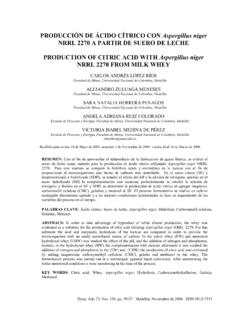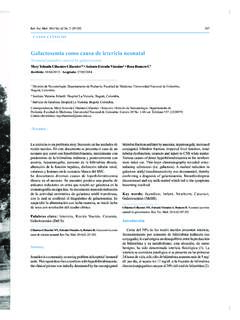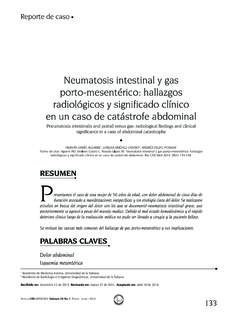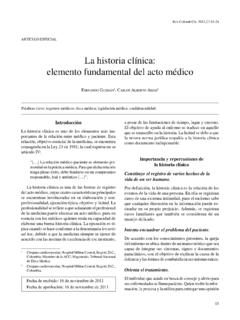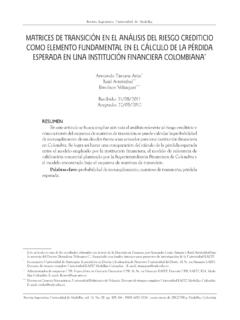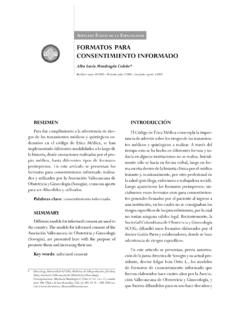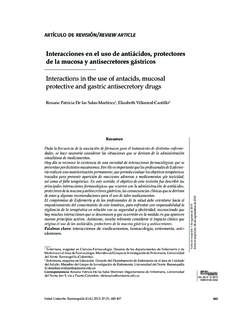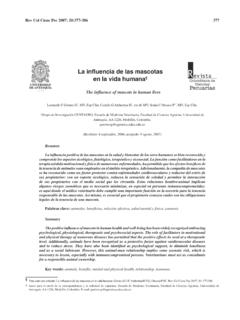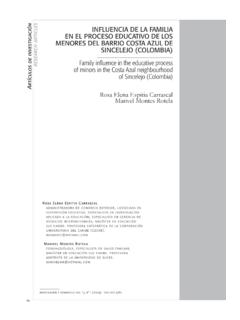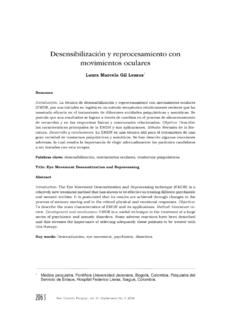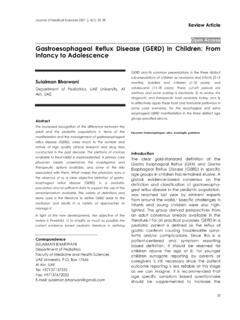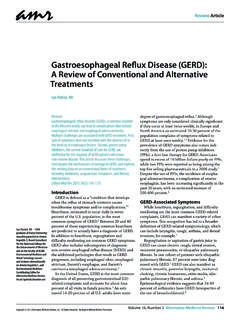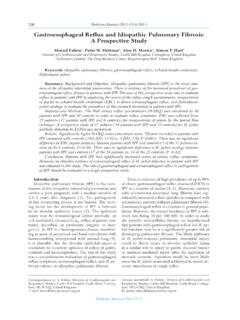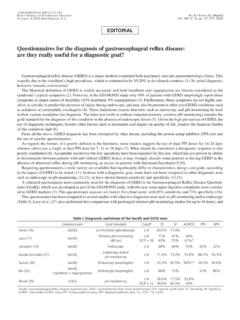Transcription of Validation of a Questionaire Regarding …
1 2013 Asociaciones Colombianas de Gastroenterolog a, Endoscopia digestiva, Coloproctolog a y Hepatolog a199 Original articlesMargarita Santa Mar a, MD,1 Mario Andr s Jaramillo, MD,2 William Otero Regino, MD,3 Mart n Alonso G mez Zuleta, of a Questionaire Regarding gastroesophageal Reflux (GERD) in a Colombian Population1 Medical Resident in Geriatrics, Bogot , Colombia. 2 Medical Resident in Internal Medicine, Bogot Colombia 3 Professor of Medicine, Gastroenterology Unit, Universidad Nacional de Colombia, Gastroenterologist at the Cl nica Fundadores, Cl nica Carlos Lleras, and Hospital San Carlos in Bogot , Colombia4 Medical Internist and Gastroenterologist, Professor of Gastroenterology at the Universidad Nacional de Colombia, Gastroenterologist in the Gastroenterology and Digestive Endoscopy Unit at the Hospital El Tunal in Bogot , ColombiaCorrespondence: William Otero, 21-05-13 Accepted: 26-06-13 AbstractBackground.
2 gastroesophageal refl ux disease (GERD) is a chronic condition resulting from retrograde fl ow of the gastroduodenal contents into the esophagus and/or adjacent organs. Prevalence of GERD in Western countries ranges from 10% to 20%. GERD accounts for 4% of consultations with family doctors. Objective: The objective of this study was to validate a scale for the Colombian GERDQ ( gastroesophageal Refl ux questionnaire ) and develop a diagnostic method for determining the severity of GERD. Materials and Methods: A diagnostic scale was validated on 84 patients and retested on 55 patients in the gastroenterology practice of the Clinica Fundadores in Bogot.
3 All patients diagnosed with GERD by gastroenterologists from January to April 2013 were asked to answer the GERD : Multiple correspondence analysis showed that when GERDQ has an 8 point score its correlation with diagnoses made by gastroenterologists is 89% which implies a 92% correlation with the scale of Montreal. Conclusion: This study shows that the GERDQ is a valid instrument for use in Colombia by general practitioners, internists and geriatricians for diagnosing refl ux disease, diagnosis, scales, questionnaire , Validation , evaluation of symptoms, refl ux disease (GERD) is a chronic condition resulting from the partial backfl ow of the gastro-duodenal contents into the esophagus and/or neighboring organs.
4 Th is can cause a wide spectrum of signs and symp-toms in or outside of the esophagus and with or without damaging , GERD has a variety of presentations. Since these symptoms do not correlate with endoscopic fi ndings, patients may present a variety of combinations including:a. Typical refl ux symptoms (heartburn and/or regur-gitation) with endoscopic evidence of damage to the Typical refl ux symptoms with normal upper gastroin-testinal (UGI) Absence of typical refl ux symptoms combined with endoscopic evidence of damage to the esophageal Atypical symptoms such as dyspepsia, coughing, asthma etc.
5 (1-3). Because of this variety the 2006 Montreal consensus defi -ned GERD as, a condition that develops when refl ux of the gastric content causes unpleasant symptoms and/or com-plications (1, 4).GERD is frequently found in the community and in everyday clinical practice. Its incidence rate in Western countries is from 10% to 20%. In Latin America it ranges from 11% to 31% when diagnosed on the basis of heart-burn and/or weekly regurgitation (5). It has a relatively lower rate in Asia of to (6). In family practice Rev Col Gastroenterol / 28 (3) 2013200 Original articlesGERD accounts for approximately 4% of all consultations (3).
6 Due to its varied clinical manifestations, it is frequently not easy to establish a diagnosis (7). Traditional diagnostic methods of the barium swallow and upper gastrointestinal (UGI) endoscopy have sensitivities of 10% to 50% and 30% to 50% respectively while 24 hour and monitoring of esophageal pH may present a normal reading for 6% to 15% of the patients with abnormal symptoms and endoscopic evidence of esophagitis. In addition, this technique is not broadly available. As a consequence of these issues, there is no gold standard objective diagnostic test (8) and, as a consequence, there has been constantly rising interest in the development of simple methods that can help primary care physicians to promptly diagnose GERD and orient the handling of this pathology (9).
7 In this regard, the Diamond study (10) developed the gastroesophageal Refl ux Disease questionnaire or GERDQ tool with the purpose of obtaining GERD diagnoses based on symptoms. Th e ques-tionnaire is easy to use in primary patient care consultation and as such is an excellent aid for establishing a diagnosis and prescribing treatment. It is also excellent for monito-ring medicated patients who have GERD. Th e GERDQ s questions are based on a selection of items from three previously validated GERD outcome tools synthesis: the refl ux disease questionnaire or RDQ (11), the gastrointes-tinal symptom rating scale or GSRS (12) and the gastroe-sophageal refl ux disease impact scale or GIS (13).
8 based on experience with these three, questions were chosen that would succeed in measuring the symptoms and seriousness of the ailment with greater accuracy (14, 15).A comparison of questionnaires about the sensitivity and specifi city of the GERDQ and RDQ for diagnosing GERD given to family doctors and gastroenterologists who took part in the DIAMOND study showed that a GERDQ score cutoff point of eight is closest to a diagnosis by a gastroen-terologist. Patients with a score of eight or more have a high probability of suff ering from GERD while those with a score lower than eight have a low probability.
9 Because a score of eight has high specifi city ( ) and sensitivity ( ), it was proposed as the cutoff point for diagnosing GERD. It has been confi rmed in various studies that the accuracy of a gastroenterologist s diagnosis is reached with the GERDQ questionnaire (14-17). Taking into considera-tion that in our midst there have been no studies validating international GERD questionnaires, we conducted this study to validate the GERDQ as a tool for the diagnosis of GERD in a Colombian population. Th is scale was selected taking into consideration that previous studies have shown that it is easy for primary health care physicians to apply and have shown its diagnostic value and accuracy (15, 18-20).
10 Th e benefi ts of Validation instead of developing a new scale are lower expenses, faster achievement, and internationally comparable results (21-23). Th e objective of this study was to evaluate the correlation of the GERDQ scale in a popula-tion group of patients with established diagnoses of GERD. METHODOLOGY Th is is a Validation study of a diagnostic scale. Th e instrument was applied to 84 adults over 18 years of age from the contri-butory health care system who had been gastroenterology outpatients at the Clinica Fundadores in the city of Bogota. Signed informed consent forms were obtained from all par-ticipants prior to participation in the study.
